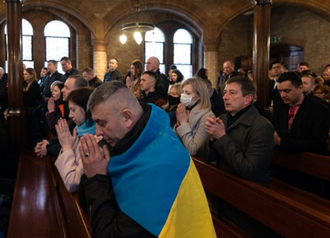Pacifism in the face of aggression

Source: Westminster J&P
We have all watched our TV screens with horror since the 24th February when Ukraine was invaded. Russia's unprovoked attack, and the nature of its assault - indiscriminate bombing and killing of civilians leading to the internal displacement and mass exodus of refugees, and the apparent threat to use biological/chemical and even nuclear weapons - has left most of us shocked. And who has not felt a strong sense of solidarity with the plight of the Ukrainians? We empathise with their plight; we pray as individuals or in community for their survival; and we try to help practically with financial or other donations. We feel one with their cause.
The West London Justice and Peace Network reflected at a recent meeting on the challenge of pacifism in times like this. How would we as individuals respond in similar circumstances? Would we start training to use Kalashnikovs or insist on suing for peace at whatever cost? When we experience a sense almost of pride in seeing these 'plucky' Ukrainians giving their all to defend their freedom, do we become part of the problem; and what is the Christian response to these challenges?
Martin Birdseye, member of the Network and long-time peace activist, helped us reflect on some of the difficult issues involved.
We were reminded of the fact that history is full of examples where in time of conflict, pacifism gets swept away on a tide of solidarity. We have certainly seen our own elected politicians rush to bolster arms supplies, talking up the importance of 'hard power'' and the strength of our military alliances, while unsaid but very apparent, is the increased risk of nuclear war. Our very human instinct for personal and human security can lead us into an aggressive response, but is this so different from the desire of Russians for security following their terrible experience of WW2 and their fears of NATO 'expansionism'?
In Britain, our taxes are spent on maintaining a nuclear arsenal, supposedly for our defence. But is this arsenal keeping us safe, or does it not lend a false justification for both NATO and Russia to vie for control of their respective 'spheres of influence'? Instead of nuclear weapons strengthening our security, have they rendered the world a more unsafe place? Would our taxes have been much better spent on tackling injustices in our own society and actively building peace globally - via aid, tackling government corruption, support for refugees, or fighting climate insecurity.
In the longer term, we also need as Christian peacemakers to examine the role of Britain as probably the world's second largest arms exporter. Arms companies and suppliers may be the only ones to gain from the current tragedy in Ukraine. Most local West London residents were unaware of the international arms fair that was recently held this year in Twickenham, yet such gatherings feed and fuel the violence that we then subsequently deplore around the world (whether in Ukraine, Yemen, or the Horn of Africa). This trade is taking place in our name as the UK government provides export licenses for 'suitable' arms manufacturers but claims to bear no responsibility for the resultant human rights abuses.
The network noted that the Ukrainians, like all of us, have a right to self-defence and that pacifism is not 'passivity'. But nor can we ignore the fact that the violence perpetrated by one side tends only to beget violence from the opposition, in a never-ending cycle of retribution. Or, as better said by Mahatma Gandhi, "an eye for an eye makes the whole world blind". So, the real challenge is to find out how we can turn to God and help others do so in these times of turmoil.
In our discussion, the network noted that concepts such as 'justice' and 'peace' can at times like this appear to be in tension but are instead totally inter-dependent. "No justice, no peace", albeit a slogan, is accurate. As Christians we have to be active peace makers. Peace groups have organised zoom prayer meetings; had a spontaneous turn-out of people on the day of the invasion to a prayer gathering; and Religions for Peace UK have submitted a letter to the Chiswick-based Bishop of the Russian Orthodox church, to be sent to the Moscow Patriarch asking him directly to appeal to Putin. What should we be doing practically all year around to promote the educational efforts of groups such as Pax Christi and the Christian Campaign for Nuclear Disarmament?
When time permits, events in Ukraine may also encourage more reflection on the Catholic teaching around the 'just war theory'. This theory sets out some of the principles that will determine if the cause of any war be 'just', and if the tactics used in warfare can also be considered 'just'. But there is now much debate as to whether the idea of a 'just war' has become an obsolete concept given that the massive predominance of civilian casualties in modern warfare undercuts the moral ground for conceiving of almost any war as just.
So, whilst we need to focus over the longer term on eliminating the underlying causes of violence and war and re-introduce the power of non-violent action, what can be done in the short term? Right now, Ukraine is being destroyed and its people scattered. Alongside all the practicalities (of sending humanitarian assistance and being welcoming to refugees), Pope Francis, pleaded: "Let the weapons fall silent. God is with those who seek peace, not those resorting to violence."
As Christians, we have to join him in condemning those who "trust in the diabolic and perverse logic of weapons" and pray for guidance on how to engage ever more effectively in the search for peace.
LINKS
Pax Christi: www.paxchristi.org.uk
Christian Campaign for Nuclear Disarmament: www.christiancnd.org.uk


















